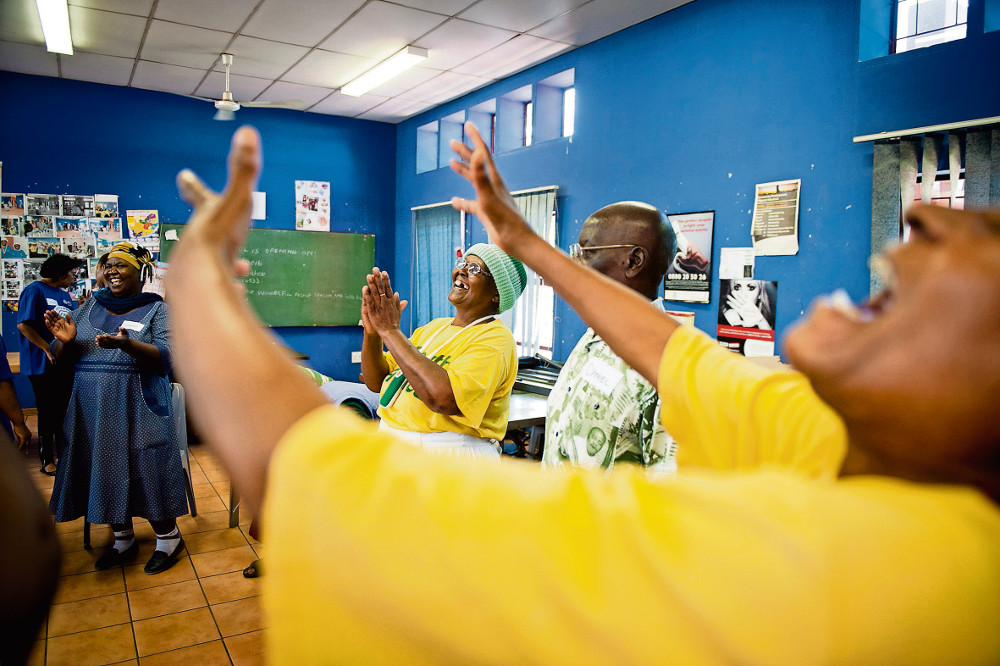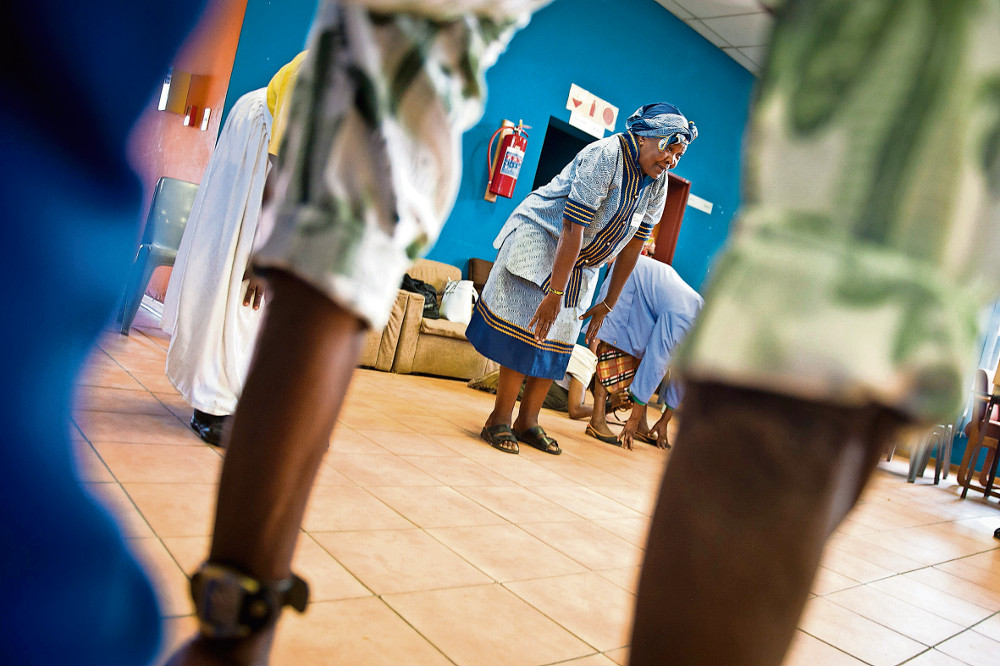‘Left! Clap! Right! Clap!” shouts a young woman dressed in an orange tracksuit. She stands in front of about 30 women, who follow her movements obediently to a regular beat, stepping from side to side with a chorus of echoing claps.
“Now go down low!” calls the instructor over the noise in the cramped room.
Giggling erupts as some women playfully protest.
The instructor, a physiotherapy student at the University of the Witwatersrand, smiles broadly and says: “You’re old but you’re not dead! Come on!”
The women laugh and keep on moving. But as the instructor bends her knees almost to her haunches with each step, the women in front of her aren’t as flexible and lower their bodies only slightly with each step.
Noticing this, the instructor quickly changes tactics: “Now up! Keep stepping! Clap your hands above your head!”
Set in a community centre on the outskirts of Diepsloot, a township north of Johannesburg, this is not your average aerobics class. Instead of gym-bunny shiny leggings and headbands, the women step and clap in long skirts and doeks.
Mental health advocacy
The gogos were recruited from the Diepsloot community to attend a mental health education and exercise day once a month by the department of social development and the South African Depression and Anxiety Group, a mental health advocacy organisation.
“Many of these gogos don’t know about mental health and have superstitious ideas so we educate them about different conditions but also, very importantly, about exercise,” says Gobonwang Motau, from the department, who runs the programme. “We focus on other health issues too because they are common, so it’s a healthy-body and healthy-mind approach.”
A 2012 study in the journal Global Health Action, involving about 4 000 South Africans over the age of 50, found that 4% had symptoms of depression in the previous year. This is similar to the estimated prevalence for the general population, with 4.9% of people suffering major depression in the previous 12 months, according to a 2009 South African Medical Journal study.
But the Global Health Action authors say this figure is probably an underestimation given that depression in older people is underdiagnosed, especially in South Africa where other health problems take precedence. “In many primary settings, patients presenting with multiple disorders that include depression often do not get diagnosed and, if they do, treatment is often focused towards other chronic diseases.”
The study also found that almost half of the respondents were obese, 77.3% had high blood pressure, 9.2% were diabetic and one in five smoked. But 60.5% did not exercise and even more (almost 70%) did not eat enough fruit and vegetables to meet nutritional requirements. All of these factors were found to be associated with increased symptoms of depression.

Suffering in silence
“The most common problem we find is that many people in the older generation don’t recognise the symptoms of mental health conditions,” says Motau. “This causes much suffering, especially in a poor place like this where there is already suffering.”
Anne Rajcoomar, who runs a counselling service in a container in Diepsloot for the anxiety group, says about one in three of her visitors are over the age of 50 but generally seek help for others, before realising they too could be mentally unwell.
“Older women usually come to ask about their children or grandchildren and, after speaking to them, we realise they are also severely depressed or have other problems which need medical attention,” Rajcoomar says.
Those seeking help will often discuss a relative who is addicted to drugs because “that’s an obvious kind of problem”, but they often “don’t even realise that depression and anxiety, for example, even exist as medical conditions”.
The Global Health Action study says, although depression needs to be actively addressed in older South Africans, the chronic conditions also affecting many people cannot be ignored and can be “addressed by creating awareness [and] education regarding healthy behaviours, such as the benefits of being physically active and eating healthily”.
Important to be active
Nonhlanhla Maseko, a senior counsellor for the anxiety group, says, although these women “can’t afford things like gym – even transport in getting to a gym would be unaffordable”, physical activity can be improved simply.
“Being active in everything you do is important. Walk a bit faster, do the house-cleaning with more energy and sometimes go by foot instead of getting a lift, depending on how far you have to go. These are all simple things that don’t cost a thing but which can help,” she says.
The women file out of the community centre after their aerobics session, smiling and chatting. A woman in a long grey skirt walks past, holding a plastic bottle of water. She approaches Maseko and says: “I have never felt so good, sisi!”
Maseko smiles and hands her a pamphlet about schizophrenia, the topic of discussion earlier.
She thanks Maseko but asks for more. “I know someone like this back home. I want to show it to my family and see. Maybe this is the answer,” she says.
Another woman shuffles towards Maseko who leads her away so they can talk privately.
Maseko returns a few minutes later: “For many people this knowledge comes as a relief. A few years back a woman was happy to know her son had schizophrenia because people will say in our language that that is a mad person. We don’t say that person is ill. And then the ill person will not seek treatment believing they are mad. We are hoping to change that.”
The group of women, now standing in a circle in the midday sun, start singing a hymn. They sway back and forth to the rhythm. As the song ends they break up into smaller groups and pairs and walk out the gate on to Diepsloot’s streets.
The young woman appears at the door to shout a final encouraging instruction: “Pick up the pace, ladies!”

Other factors obscure an age-old problem
- Between now and 2050, the proportion of the world’s older adults is projected to almost double from 12% to 22%.
- Globally, an estimated 15% of adults over the age of 60 suffer from a mental disorder, the most common being dementia and depression.
- About 47.5-million people live with dementia, but this is projected to increase to 75.6-million by 2030 – and the bulk of these sufferers will be in low- and middle-income countries.
- Globally, 7% of the older population suffers from depression, but it is both underdiagnosed and undertreated; symptoms are often overlooked because they coincide with other serious problems commonly encountered in this age group, such as lung disease, hypertension and diabetes.
- About 3.8% of older people have anxiety disorders.
- They are particularly vulnerable to factors that cause mental distress such as a loss of mobility and independence – and, if they were working, a drop in socioeconomic status when they retire.
- One in 10 older people worldwide experiences abuse – physical, sexual, psychological, emotional or financial. – World Health Organisation, September 2015 Mental Health and Older Adults fact sheet
Depressed or anxious? For free help contact the South African Depression and Anxiety Group on: 0800 12 13 14 (24 hour helpline). For a suicidal emergency call 0800 567 567. Amy Green is a 2014/15 Pfizer Mental Health Journalism Fellow
